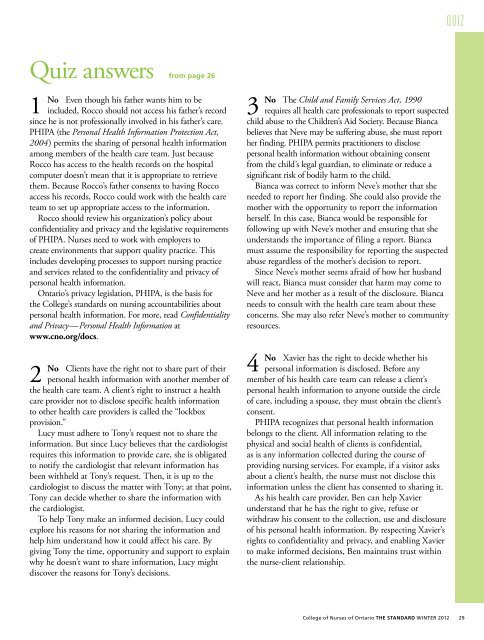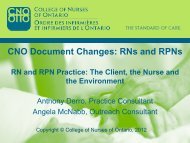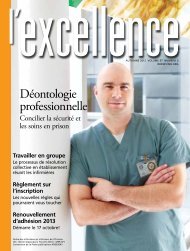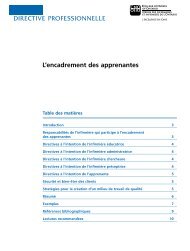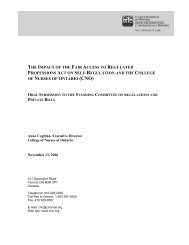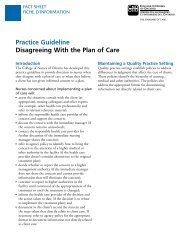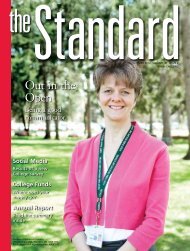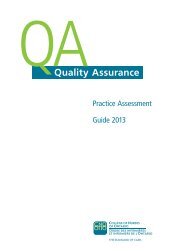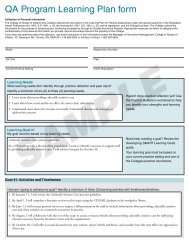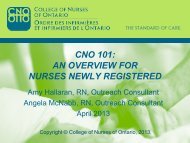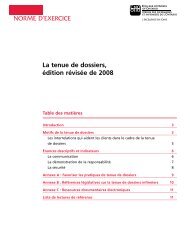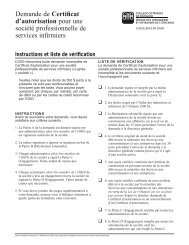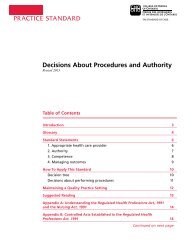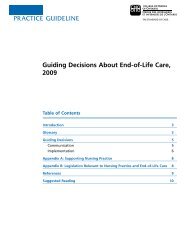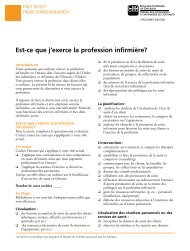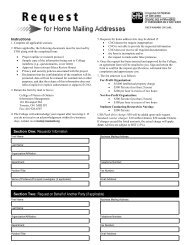The Standard, Winter 2012 - College of Nurses of Ontario
The Standard, Winter 2012 - College of Nurses of Ontario
The Standard, Winter 2012 - College of Nurses of Ontario
You also want an ePaper? Increase the reach of your titles
YUMPU automatically turns print PDFs into web optimized ePapers that Google loves.
QuizQuiz answers from page 261No Even though his father wants him to beincluded, Rocco should not access his father’s recordsince he is not pr<strong>of</strong>essionally involved in his father’s care.PHIPA (the Personal Health Information Protection Act,2004) permits the sharing <strong>of</strong> personal health informationamong members <strong>of</strong> the health care team. Just becauseRocco has access to the health records on the hospitalcomputer doesn’t mean that it is appropriate to retrievethem. Because Rocco’s father consents to having Roccoaccess his records, Rocco could work with the health careteam to set up appropriate access to the information.Rocco should review his organization’s policy aboutconfidentiality and privacy and the legislative requirements<strong>of</strong> PHIPA. <strong>Nurses</strong> need to work with employers tocreate environments that support quality practice. Thisincludes developing processes to support nursing practiceand services related to the confidentiality and privacy <strong>of</strong>personal health information.<strong>Ontario</strong>’s privacy legislation, PHIPA, is the basis forthe <strong>College</strong>’s standards on nursing accountabilities aboutpersonal health information. For more, read Confidentialityand Privacy — Personal Health Information atwww.cno.org/docs.2No Clients have the right not to share part <strong>of</strong> theirpersonal health information with another member <strong>of</strong>the health care team. A client’s right to instruct a healthcare provider not to disclose specific health informationto other health care providers is called the “lockboxprovision.”Lucy must adhere to Tony’s request not to share theinformation. But since Lucy believes that the cardiologistrequires this information to provide care, she is obligatedto notify the cardiologist that relevant information hasbeen withheld at Tony’s request. <strong>The</strong>n, it is up to thecardiologist to discuss the matter with Tony; at that point,Tony can decide whether to share the information withthe cardiologist.To help Tony make an informed decision, Lucy couldexplore his reasons for not sharing the information andhelp him understand how it could affect his care. Bygiving Tony the time, opportunity and support to explainwhy he doesn’t want to share information, Lucy mightdiscover the reasons for Tony’s decisions.3No <strong>The</strong> Child and Family Services Act, 1990requires all health care pr<strong>of</strong>essionals to report suspectedchild abuse to the Children’s Aid Society. Because Biancabelieves that Neve may be suffering abuse, she must reporther finding. PHIPA permits practitioners to disclosepersonal health information without obtaining consentfrom the child’s legal guardian, to eliminate or reduce asignificant risk <strong>of</strong> bodily harm to the child.Bianca was correct to inform Neve’s mother that sheneeded to report her finding. She could also provide themother with the opportunity to report the informationherself. In this case, Bianca would be responsible forfollowing up with Neve’s mother and ensuring that sheunderstands the importance <strong>of</strong> filing a report. Biancamust assume the responsibility for reporting the suspectedabuse regardless <strong>of</strong> the mother’s decision to report.Since Neve’s mother seems afraid <strong>of</strong> how her husbandwill react, Bianca must consider that harm may come toNeve and her mother as a result <strong>of</strong> the disclosure. Biancaneeds to consult with the health care team about theseconcerns. She may also refer Neve’s mother to communityresources.4No Xavier has the right to decide whether hispersonal information is disclosed. Before anymember <strong>of</strong> his health care team can release a client’spersonal health information to anyone outside the circle<strong>of</strong> care, including a spouse, they must obtain the client’sconsent.PHIPA recognizes that personal health informationbelongs to the client. All information relating to thephysical and social health <strong>of</strong> clients is confidential,as is any information collected during the course <strong>of</strong>providing nursing services. For example, if a visitor asksabout a client’s health, the nurse must not disclose thisinformation unless the client has consented to sharing it.As his health care provider, Ben can help Xavierunderstand that he has the right to give, refuse orwithdraw his consent to the collection, use and disclosure<strong>of</strong> his personal health information. By respecting Xavier’srights to confidentiality and privacy, and enabling Xavierto make informed decisions, Ben maintains trust withinthe nurse-client relationship.<strong>College</strong> <strong>of</strong> <strong>Nurses</strong> <strong>of</strong> <strong>Ontario</strong> the standard winter <strong>2012</strong>29


